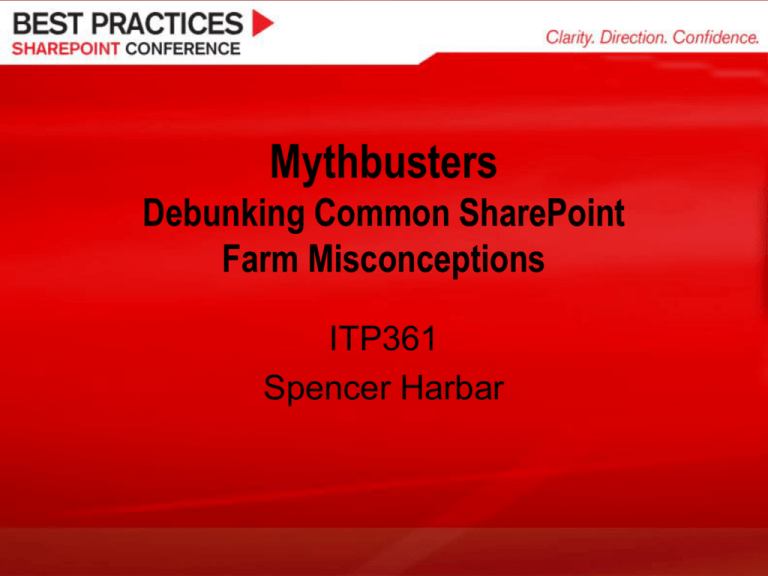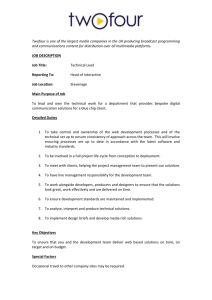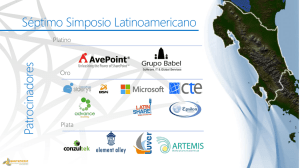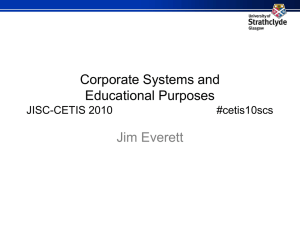Mythbusters – Debunking Common SharePoint Farm
advertisement

Mythbusters Debunking Common SharePoint Farm Misconceptions ITP361 Spencer Harbar Spencer Harbar, MVP, MCSD.NET, MCAD, MCSE, APM www.harbar.net Enterprise Architect working with some of Microsoft’s largest customers deploying Office SharePoint Server 2007. 15 years in Enterprise IT ISPA Board Member Agenda Common SharePoint Myths Farm Topologies Shared Service Providers Authentication Global Deployments High Availability SharePoint Interactive “Magic Numbers” session Farm Topologies Farm Topologies (Roles) “Web Front End” (WFE) Terminology hangover from previous version WSS Web Application Service Functional Decomposition of: Search Index & Search Query Excel Services InfoPath Forms Services Document Conversions Content Deployment Farm Topologies “No Topology Restrictions” No enforced restrictions Plenty of real world restrictions, for example – Number of “WFE”s – Number of Web Applications – Topology Models remain appropriate “Load balancing” of: Search Query Servers Excel Calculation Services Overview of functional decomposition, fundamental to planning farm topologies. FARM TOPOLOGIES Shared Services Shared Service Providers (SSPs) “SSPs are implemented as Web Applications” Many elements make up a SSP Web Application is for administration only “SSP Admin can be provisioned on dedicated servers” It’s a Web Application! Therefore deployed to every “WFE” Shared Service Providers (SSPs) Office Server Web Services (IIS) SSP DB SSP Search DB SharedServices1 (Web App) Content DB My Site Host (Web App) Search Index Overview of SSP elements, fundamental to understanding intra farm server communications. SHARED SERVICE PROVIDERS Authentication Authentication “Kerberos makes SharePoint faster” It avoids Secure Channel (NTLM) bottlenecks Performance benefit generally for long user sessions Environment Specific “One DC for every three WFEs” Old wives tale It depends upon your authentication scenario Placement of DCs is far more important Global Deployments & High Availability Global Deployments “SharePoint can’t do geo-distribution” Plenty of options Consider carefully why you may need them SharePoint Online “SharePoint doesn’t work over the WAN” A slow WAN link problem is a slow WAN link problem! Not a SharePoint problem High Availability “Web Gardens give you better performance” Don’t use them (yet!) “A single Farm can host 100s of Web Applications” ~10 Web Applications per Farm is reasonable SharePoint loves RAM Request Routing or DNS increases operational service burden considerably High Availability “Web Apps can be deployed to specific servers in a Farm” Request Routing or DNS increases operational service burden considerably There is nothing wrong with multiple farms “SharePoint can’t scale” average daily load throughput of: ~5 million TIFF images ~1.9 million Microsoft Office documents. 40+ million content items were loaded into SharePoint in only 13 days Average content database size of: 200.65 GB for Divisional Site Collections 137.60 GB for departmental site collections 539 GB for the search database Over 5TB content storage with capacity for double “SharePoint can’t scale” “SharePoint can’t scale” Place picture or screen shot here technet.microsoft.com/en-us/library/cc262067.aspx SharePoint “Magic Numbers” SharePoint “Magic Numbers” “How many XXXX can I have in my SharePoint?” Plan for Software Boundaries (TechNet) technet.microsoft.com/en-us/library/cc262787.aspx SharePoint “Magic Numbers” There are only guidelines for acceptable performance Such guidelines are based upon test scenarios – 1 thru 1 Database Server – 1 thru 8 Web Servers – Team Sites (55%), Doc Workspace (20%), Meeting Workspace (10%), Blog (10%), Wiki (5%) – Other scenarios coming soon – Often refined based on customer deployments Logical Architecture "Magic Numbers" Logical architecture object Guidelines for acceptable performance Shared Services Provider (SSP) 3 per farm (20 per farm maximum) Zone 5* per farm Web application 99 per SSP Internet Information Services (IIS) application pool 8 per Web server Site collection 50,000 per Web application Content database 100 per Web application Site collection 50,000 per database Example “Magic Numbers” Site object Guidelines for acceptable performance Scope of impact when performance degrades Site collection 50,000 per content database Farm Site collection 150,000 per Web application Farm Web site 250,000 per site collection Site collection Subsite 2,000 per Web site Site view Document 5 million per library Library Item 2,000 per view List view Document file size 50MB (2GB max*) Library, file save performance List 2,000 per Web site List view Field type List view Web Part 256 per list 2,000 per document library 4,096 per list 50 per page Managed path 20 per Web application Web application Column Library and list view Page There are NO magic numbers! Successful Solutions Architecture is basically two things: Compromise Reduction of Complexity Evaluate solution holistically ensuring adequate compromises. Test and monitor as you build and deploy your solution. Re-design the solution to ensure that you do not exceed capacity guidelines. Test, test, test! Post conference DVD with all slide decks Sponsored by Thank you for attending!




